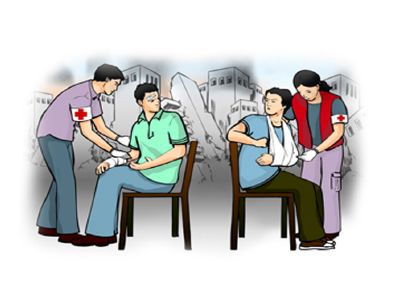FUNDAMENTAL PRINCIPLES OF THE RED CROSS AND RED CRESCENT MOVEMENT
INTERNATIONAL HUMANITARIAN LAW
The International Humanitarian Law Office is mainly responsible for the advocacy, promotion and dissemination of the seven fundamental principles of the International Red Cross and Red Crescent Movement, dissemination of the basics of IHL, and the advocacy of domestic legislation and measures to implement provisions of the Geneva Conventions.
The Seven Fundamental Principles:
- Humanity
- Impartiality
- Neutrality
- Independence
- Voluntary Service
- Unity
- Universality
Activities:
- Dissemination and Capacity Building
The IHL Office regularly conducts orientation sessions about the Red Cross Movement, its fundamental principles and activities, and the basics of International Humanitarian Law (IHL). Regular dissemination/orientation session normally runs for two to three hours and is held usually in the classroom setting as it involves film showing and multi-media presentations. Priority audiences are: Red Cross personnel , community leaders and health workers, Armed Forces of the Philippines and Philippine National Police personnel and its auxiliaries.
- Advocacy and Promotion
- Among the activities of the IHL Office is the advocacy of domestic legislation and measures to implement provisions of the Geneva Conventions.
The IHL Office, in cooperation with International Committee of the Red Cross (ICRC) and various stakeholders of IHL, successfully lobbied the domestic legislation on IHL: Republic Act 9851 (Philippine Act on Crimes Against International Humanitarian Law, Genocide, and Other Crimes Against Humanity), which was signed into law in December 2009. Another milestone in the field of IHL is the signing of RA 10530 also known as the Red Cross and Other Emblems Act of 2013. First filed in the Senate by Senator Richard J. Gordon during the 13th Congress, the bill was finally signed into law last May 7, 2013.
As part of advocacy and promotion and with the issuance of Executive Order 134 declaring every August 12 as IHL Day, PRC took a step further by designating the month of August as IHL Month. The IHL Office organizes and monitors various activities and events organized in different PRC chapters nationwide in collaboration with other agencies who are members of the National IHL Committee.
- National Moot Court Competition on IHL
An annual event held every last quarter of the year, the National Moot Court Competition on IHL is organized jointly by PRC, ICRC, and Supreme Court of the Philippines. The IHL Office serves as the overall coordinator and secretariat of the event. The competition aims to provide a venue for law students to become acquainted with and proficient in IHL issues. The competition is based on a hypothetical war problem leading to a charge of war crimes against the military commander. The participants are tasked to write memorials and orally argue both for the prosecution and the defense using the different laws and principles of IHL.
Philippine Red Cross
Address: 37 EDSA corner Boni Avenue, Mandaluyong City 1550
Hotline: 143 Trunkline +63 2 790 2300
Email: communication@redcross.org.ph










